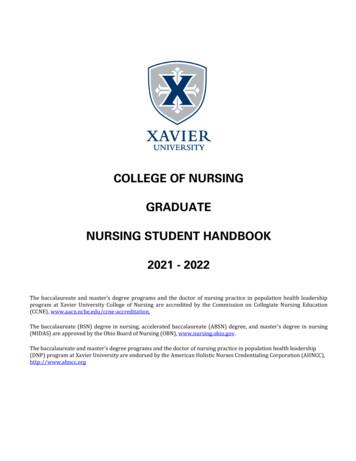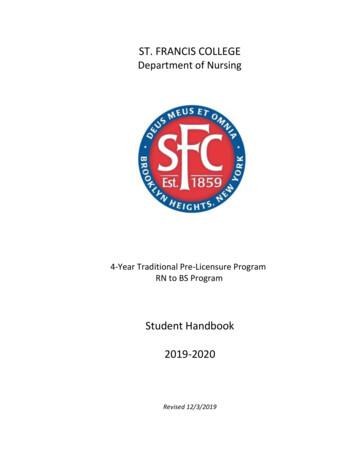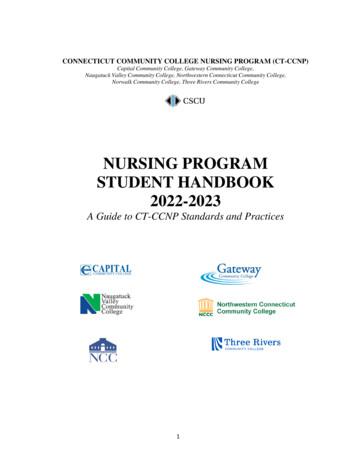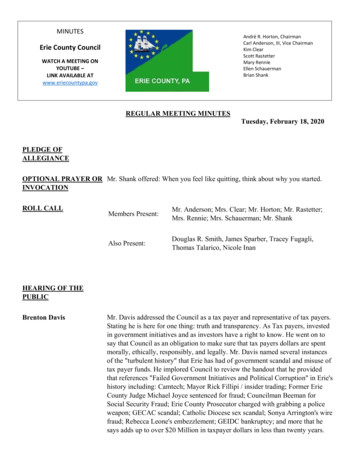PRACTICAL NURSING STUDENT HANDBOOK Spring 2022 - City Colleges Of Chicago
CITY COLLEGES OF CHICAGOSCHOOL OF NURSINGPRACTICAL NURSING STUDENT HANDBOOKSpring 2022
Disclaimer: The contents of the Nursing Student Handbook are effective as of Spring 2022. Anyinformation contained herein is subject to change. Policies in this handbook supersede CCC policies tocomply with regulations and accreditation standards. For questions about information contained herein,please contact the School of Nursing at 312-850-7159.2
Table of ContentsMission . 6Core Values. 6Philosophy . 6CCCSON Conceptual Framework . 6PROGRAM INFORMATION . 7Non-Discriminatory and Diversity Practices . 8Title IX Related to Disability . 8Student Responsibility Statement . 8AMERICAN NURSES ASSOCIATION STUDENT NURSE CODE OF ETHICS . 8STUDENT RESPONSIBILITIES IN THE NURSING PROGRAM. 9General Responsibilities/Student Policy Manual . 9General Responsibilities/Professionalism. 9Faculty and Student Relationship. 10Student and Client Relationship . 10Program Commitment . 10Student E-mail Communication Policy . 10GUIDELINES OF STUDENT CONDUCT . 10Student Conduct . 11Mobile Device and Computer Responsibilities . 11SOCIAL MEDIA POLICY. 12Use of Electronics . 12Health Insurance Portability and Accountability Act (HIPAA) of 1996 Compliance . 12Penalties and Consequences . 12Social Media Etiquette . 12Maintain confidentiality . 12PROGRAM DRESS CODE STANDARDS . 13Uniforms . 13CCCSON Program Dress Code Standards . 13Required Clinical Equipment . 14ACCESS CENTER . 14END OF PROGRAM OUTCOMES . 15Advanced Certificate Practical Nursing Program Outcomes . 15EFFECTIVENESS MEASURES STATE LICENSE EXAM PERFORMANCE . 15Program Exit Exams and Assessments . 15ADMISSION AND POLICY REQUIREMENTS . 163
ADVANCED CERTIFICATE IN PRACTICAL NURSING GRADING SCALE . 17PROGRESSION POLICY . 18EXAMS . 20REMEDIATION POLICY . 20Individualized Remediation Prescription Plan (IRPP) . 20GRADE APPEAL POLICY . 21NON-ACADEMIC FORMAL COMPLAINT FILING PROCEDURE . 21REINSTATEMENT POLICY. 21VETERANS READMISSION POLICY. 22Ineligibility for Reinstatement . 23PREGNANCY POLICY . 23POST COMPLETION POLICY . 24HEALTH AND CLINICAL REQUIREMENTS. 24Vaccinations/Titers . 25Drug Screen . 25Healthcare Provider Basic Life Support (BLS) . 26Criminal Background Check . 26Student Health Coverage Insurance . 27Student Malpractice/Liability . 27ATTENDANCE POLICY AND ACTIVE PURSUIT. 27CLINICAL POLICY . 27CLINICAL ATTENDANCE POLICY. 28STUDENT RESPONSIBILITIES AND CONDUCT IN THE CLINICAL AGENCIES . 28Blood-borne Pathogen Exposure . 29COVID-19 . 30Student Practice Regulations . 30UNUSUAL OCCURRENCE GUIDELINES . 31TRANSPORTATION . 31CLINICAL ORIENTATION . 31NURSING SKILLS LAB REQUIREMENTS AND POLICIES . 32NURSING SKILLS LABORATORY ORIENTATION INFORMATION . 32REMOTE LEARNING . 34Student Remote Expectations . 344
Dear Student Nurse:On behalf of the nursing administration, faculty, and staff, we welcome you to the City Colleges ofChicago School of Nursing (CCCSON). We are committed to providing assistance as you proceed throughthe nursing program to certification. You will be eligible to take the National Council LicensureExamination for Practical Nurses (NCLEX-PN) upon successful completion of the nursing program.In addition to the day-to-day interaction with the faculty, the college provides a broad range of servicesto assist students in achieving their academic and life goals. We encourage you to become familiar withall the services and resources Malcolm X College has to offer.The City Colleges of Chicago Practical Nursing program offers quality, affordable education and exposureto real-world industry experience that will prepare you for the evolving discipline of nursing. TheCCCSON administration, faculty, and staff have developed the student nurse handbook to provideguidance and assistance as you navigate through your nursing program journey. The student handbookincludes a nursing program description, curriculum, policies, procedures, and other vital information.Please use this handbook as a reference throughout your program to facilitate achievement of academicand professional excellence.Welcome to the City Colleges of Chicago School of Nursing. We wish you success throughout yourcourse of study.Sincerely,Tammy Scott-Brand, MSN-ED, BS, RNDean of the School of NursingPatricia Nabal, DNP, MSN, FNP, RN-BCAssociate Dean of the School of Nursing – A.A.S Nursing ProgramTanisha Rufus, DNP, RNAssociate Dean of the School of Nursing – BNA and Practical Nursing Programs5
MissionThe City Colleges of Chicago delivers exceptional learning opportunities and educational services fordiverse student populations in Chicago. We enhance knowledge and skills, collaboration, communityservice, and life-long learning by providing a broad range of quality, affordable courses, programs, andservices to prepare students for success in a technologically advanced and increasingly interdependentglobal society. We work proactively to eliminate barriers to employment and to address and overcomecausal factors underlying socio- economic disparities and inequities of access and graduation in highereducation.The nursing administration, faculty, and staff embrace the City Colleges of Chicago School of Nursing(CCCSON) mission:The mission of the City Colleges of Chicago School of Nursing is to provide students with an evidencebased education, to prepare transformational and compassionate nurses in the delivery of culturallycompetent patient care in a caring and healing environment.Core ValuesThe nursing administration, faculty, and staff embrace the City Colleges of Chicago’s core values.Please refer to the core values adopted from the Chicago City College academic and student ademic Student Policy/AcademicStudentPolicy.pdfPhilosophyThe philosophy of the CCCSON is to provide high quality, accessible, affordable educationalopportunities and services to all members of the community. The educational environment of thecollege is designed to promote individual development and to improve the overall quality of life in amulticultural community.CCCSON Conceptual FrameworkThe CCCSON encompasses nine concepts: critical thinking, caring, professionalism, communication,person, partnership, community, health and leadership. The concepts provide the framework of thenursing program intended to move the students to achieve the end of program outcomes. The conceptsare defined as:Critical Thinking: Essential to the provision of safe, competent, and quality nursing care. The importanceof critical thinking is directly related to the complexity of healthcare and the ever-changing issuesinvolving society. Critical thinking in nursing includes analyzing, applying standards, seeking information,logical reasoning, predicting, and transforming knowledge into application.6
Caring: A nursing quality that influences client care. The process involves empathic and compassionateinteractions with a multidisciplinary team, clients, their families, and the community as a whole.Professionalism: The values, attitudes, and practices that competent nurses exemplify. It isdemonstrated in nursing as a scholarly discipline with academic qualifications, licensure, quality, andcompetent care. Nursing achieves professionalism through evidence-based practice, research, andpublication.Communication: The foundation of professional relationships between the nurse and client, family,peers, and the multidisciplinary team. The process of therapeutic communication occurs through activelistening, nonverbal, verbal, and written communication.Person: Includes the participants in the healthcare delivery system. The person is a unique holistic beingwith physical, emotional, intellectual, social, spiritual, and environmental needs. These needs arecommon to all human beings regardless of culture, race, or gender, which exist throughout a person’slifespan and are influenced by levels of health and interaction with the environment.Partnership: Provides opportunities for sharing nursing knowledge between colleagues globally. Nursingpartnerships include a transfer of knowledge and services. The ultimate goal of nursing partnerships isto promote sustainable and long-lasting positive outcomes for the client, community, and society.Community: The nurse recognizes the socio-political and economic issues in the community that affectthe client’s health and serves as an advocate. Nursing incorporates nursing practices, whichdemonstrates respect for ethnic and cultural diversity and socio-cultural practices of clients in thecommunity. The CCCSON community provides service to Chicago and its surrounding areas.Health: State of balance of the physical, emotional, social, spiritual, environmental, and intellectualcomponents of the person. Healthcare needs vary throughout the lifespan, and nurses have a crucialrole in assessing and providing healthcare needs.Leadership: Encompasses a distinctive set of personal qualities: integrity, courage, initiative, andinfluence. Nursing leaders play a key role in shaping the nursing profession to be more responsive to anevolving healthcare system.PROGRAM INFORMATIONPractical nurses (PN) function as members of the healthcare team and are concerned with the carethroughout the life span. Within the provisions of the Illinois Nurse Practice Act of 2017, the Practical7
Nurse provides client care and participates in teaching under the supervision of a licensed registeredprofessional, advanced practice nurse, or medical provider. Nursing education correlates clinicalexperiences and theoretical knowledge from nursing, communication, and the biologic and socialsciences. Refer to the Il Nurse Practice Act ctID 1312&ChapterID 24City Colleges of Chicago School of Nursing Practical Nursing Program is a one-year Advanced Certificateprogram, preparing individuals to function in the practical nurse role. Individuals completing thepractical nursing program meet the education requirements and are eligible to sit for the NCLEX-PNexam to become a licensed practical nurse (LPN).Non-Discriminatory and Diversity PracticesCCCSON is a premier first choice educational destination, which is highly accessible to a diverse studentpopulation in Chicago and globally. CCCSON is widely recognized for excellence and leadership. TheCCCSON’s position is that diversity enriches an institution and society. The CCCSON appreciates diverseperspectives and values collective differences and similarities.Discrimination based on age, national origin, ancestry, race, color, religion, sex, sexual orientation,disability, genetic information, military status, or veteran status is absolutely prohibited. Any violationmay result in disciplinary action, up to and including dismissal from the program.To report discrimination or harassment as based on the aforementioned, please contact the CityColleges of Chicago District Office at 312-553-2500.The following link provides the policy and procedure for filing a al-Opportunity-Office-(EEO).aspxTitle IX Related to DisabilityIn addition, the College’s Title IX (related to disability discrimination) and section 504 and Title II of theAmericans with Disabilities Act (related to disability discrimination) Coordinator is the director ofInclusion, Diversity, and Equal Opportunity Compliance.The Coordinator can be reached at 312-553-2500.Student Responsibility StatementStudents are responsible for the content of the handbook and adhering to the policies and procedurescontained herein. Information contained herein is subject to modification, deletion, and change.Changes in the program or policy will be communicated to the student via the student’s City Colleges ofChicago (CCC) email address, written correspondence, and learning management system postings.AMERICAN NURSES ASSOCIATION STUDENT NURSE CODE OF ETHICSNursing students have a responsibility to society in mastering the academic theory and clinical skillsneeded to provide nursing care. The clinical setting presents unique challenges and responsibilities. TheCode of Academic and Clinical Conduct (CACC) is based on an understanding that to practice nursing as a8
student is an agreement to uphold the trust society has placed in us. The statements within the CACCprovide guidance for the nursing student in their personal and professional development and are e for the rights of all clientsMaintain client confidentialityTake appropriate actionProvide care for the client in a timely, compassionate, and professional mannerCommunicate client care in a truthful, timely, and accurate mannerActively promote the highest level of moral and ethical principles and accept responsibility for ouractionsTreat others with respect and promote an environment that respects human rights, values, andchoice of cultural and spiritual beliefsCooperate in a reasonable manner with the academic faculty and clinicalstaff to ensure the highest quality of client careRefrain from performing any technique or procedure for which the student has not been adequatelytrainedRefrain from deliberates action or omission of care in the academic or clinical setting that createsunnecessary risk of injury to the client, self, or othersAssist the staff nurse or instructor in ensuring that there is full disclosure, and that properauthorization is obtained from clients regarding any form of treatment or researchAbstain from the use of any substances in the academic and clinical setting that impair judgmentStrive to achieve and maintain an optimal level of personal healthUphold policies and regulations related to academic and clinical performance, reserving the right tochallenge and critique rules and regulations as per school grievance \\ANA Code of Ethics Link http://www.nursingworld.org/codeofethicsSTUDENT RESPONSIBILITIES IN THE NURSING PROGRAMGeneral Responsibilities/Student Policy ManualIn addition to the rules and regulations contained in the handbook, students are expected to adhere tothe CCC policies, rules, and regulations as well as adherence of policies, rules, and regulations of anyfacility or institution to which the student nurse is assigned. The City Colleges of Chicago handbook maybe reviewed at:https://www.ccc.edu/menu/Documents/Academic Student Policy/AcademicStudentPolicy.pdfGeneral Responsibilities/ProfessionalismProfessionalism implies a respect and courtesy for others in the educational setting. Nursing studentsmust maintain the highest standards of professionalism in all learning settings. Students enrolled in thenursing program learn the importance of establishing and maintaining professional relationships andboundaries.9
Faculty and Student RelationshipFaculty and students will maintain a professional relationship. If an issue is unable to be resolvedprofessionally, the student must follow the grievance procedure or grade appeal process as applicable.Failure to adhere to this standard may result in disciplinary action.Student and Client RelationshipStudents will maintain a professional student nurse and client relationship. Students must treat clientswith dignity and respect and advocate in the best interest of the client. Students may not decline careof clients.Program CommitmentSignificant time, effort, and commitment are required for successful completion of the CCCSONprogram. Personal and work commitments must be considered and require balance to meet the rigor ofthe nursing program.Student E-mail Communication PolicyThe City Colleges of Chicago (CCC) has established email as an official means of communication withstudents. An official CCC email address is issued to each student upon admission to the college. Studentsare required to check their CCC email regularly as the communication disseminated may be timesensitive. Failure to read college communication sent to CCC email accounts does not absolve studentsof its contents. Only official CCC email will be accepted. Personal email is not allowed forcorrespondence. Correspondence must be professional. Failure to adhere to a professional emailstandard may result in disciplinary action, up to and including dismissal from the nursing program.Please refer to the CCC Responsible Computer Use sponsible Computer Use Policy0712.pdf.GUIDELINES OF STUDENT CONDUCTThe CCCSON upholds integrity, truth, and honesty. Students are expected to adhere to high standards ofhonesty in their academic and professional endeavors. Plagiarism and cheating of any nature is nottolerated and will result minimally in receiving an “F” to the related assignment and/or exam. Refer to10
the Academic Integrity and Dishonesty policy in the Academic and Student Policy manual.https://www.ccc.edu/menu/Documents/Academic Student Policy/AcademicStudentPolicy.pdfStudent ConductCCCSON students are expected to conduct themselves in a manner that respects the rights of others andin support of the mission, vision, and values of the CCC. Misconduct will result in disciplinary action,which may lead to up to and including dismissal from the CCCSON program. Violations include but arenot limited to:1. Disrespectful behavior to administration, faculty, and staffa. Escalating voice in an aggressive or threatening mannerb. Profanity or any inappropriate language expressed verbally or via emailc. Dissemination of negative written or social media correspondencesd. Defamation of character2. Physical and/or verbal abuse, threats, intimidation, harassment, and other misconductthat threatens or endangers the health or safety of any person3. Possession of weapons, ammunition, and/or explosives4. Obstruction or disruption of teaching, research, administration, and/or disciplinaryProceedings5. Dishonesty, stealing, or forgery6. Possession or consumption of alcohol, marijuana, or controlled substancesPlease refer to the Standards of Conduct in the Academic and Student Policy manual for completeinformation on the code of conduct and disciplinary c Student Policy/AcademicStudentPolicy.pdfMobile Device and Computer ResponsibilitiesProfessional behavior and proper technology etiquette should be observed at all times when using cellphones, iPads, iPods, mobile devices, laptops, or other electronic devices. These may be used only whenauthorized by faculty and for clinical activities and not personal use. Students must adhere to thefollowing:1. Cell phones and mobile devices must be on “airplane mode” or “silent” during class or clinicalexperiences.2. Personal phone conversations or texting are not allowed while in a client area. A clinical warningwill be given for the first violation of using the mobile device during clinical time. A second violationwill result in the nursing student being dismissed for the day and receiving an unexcused absence. Athird violation may result in dismissal from the clinical rotation resulting in a course failure. Mobiledevices can be utilized only in designated areas and only on a designated break. Students violatingpatient privacy with the mobile device will be subject to HIPAA infractions of the clinical agency.3. Students may not take photographs in the clinical or lab setting nor make copies of clientrecords. Use of facility computers for personal use is prohibited.11
SOCIAL MEDIA POLICYStudents must adhere to the Social Media Policy. Students must abide by the Standards of Conductlisted in the Academic and Student Policy Manual.Use of ElectronicsStudents are prohibited from recording, and taking photos or videos of classroom, skills lab, or clinical.Interactions or formal sessions or meetings with nursing administration, faculty, and staff may not beaudio or video recorded without prior consent.Health Insurance Portability and Accountability Act (HIPAA) of 1996 ComplianceClients have a legal right to confidentiality about their health, and nurses have a legal obligation tosafeguard patient confidentiality. Students may not provide information about client(s) to anyone notdirectly involved with the patient’s care. Conversation related to clients is only allowed in the clinicalarea, clinical conference area, and the classroom for the purposes of furthering nursing education.Discussion related to clients or any clinical occurrences are prohibited in public places such as thecafeteria, lounge, or at home. Any materials or documents with identifying patient information may notbe removed from the clinical setting and must be discarded in a confidential manner.Students are required to strictly adhere to HIPAA regulations. Students may be required to sign a HIPAAform.Learn more about HIPAA. mary.pdfLearn about HIPAA and sionals/index.htmlPenalties and ConsequencesStudents in violation of the Social Media Policy and HIPAA laws are subject to disciplinary measures fromthe nursing program, up to and including dismissal from the program and/or college.The judicial process as outlined in the Academic and Student Affairs Policy Manual will be followed fordisciplinary matters.Social Media EtiquetteThe key to success in social media is being thoughtful before posting, and respectful of the purpose ofthe social media community.Maintain confidentialityPosting of confidential or proprietary information about City Colleges of Chicago, clinical affiliates or itsstudents, faculty, and staff is prohibited.12
Ethical judgment should be used and college policies and federal requirements followed. Students areprohibited from posting, publishing, or distributing any class or course material (including notes,PowerPoint presentations, handouts, or recordings) without written permission from the instructor.When contributing to a social networking site, there is a digital footprint that can be traced. Interactionsshould be professional and students should error on the side of caution when placing writtencommunicati
City Colleges of Chicago School of Nursing Practical Nursing Program is a one-year Advanced Certificate program, preparing individuals to function in the practical nurse role. Individuals completing the practical nursing program meet the education requirements and are eligible to sit for the NCLEX-PN exam to become a licensed practical nurse (LPN).
Xavier University Undergraduate Nursing Handbook 2021-2022 Page 1 INTRODUCTION AND HANDBOOK ACKNOWLEDGEMENT . Introduction The Xavier University College of Nursing publishes an Undergraduate Nursing Student Handbook and a Graduate Nursing Student Handbook. The first section of each handbook is common to both, covering Xavier
The Xavier University College of Nursing publishes an Undergraduate Nursing Student Handbook and a Graduate Nursing Student Handbook. The first section of each handbook is common to both, covering Xavier University, College of Nursing and clinical student policies and information. The second section of each
NURSING STUDENT HANDBOOK 2016-2017 SCHOOL OF NURSING . The Nursing Student Handbook (NSH) provides students with information about Henry Ford College's (HFC) Nursing Program, its curriculum, policies, procedures, expectations and . excellence in nursing education. In the fall of 1988, an Advanced Placement program for Licensed Practical
Edmonds Community College Nursing Student Handbook Revised 11/2016 4 Welcome to the Edmonds Community College Practical Nursing Program The Nursing Student Handbook contains the policies and procedures for the Practical Nursing (PN) program. It is organized into five sections: General Program Policies, Academic Policies, Course Policies,
RN-BSN Nursing Student Handbook Acknowledgment Form 2019-2020 Academic Year Dear RN Nursing Student, Please read /review the RN-BSN Nursing Student Handbook and return this signed Handbook Acknowledgment Form to the Nursing Department within the first two (2) weeks of the Fall/Spring semester classes. Failure to do so will result in a meeting with
1 GENERAL PROGRAM INFORMATION The Nursing Program Student Handbook is a guide to CT-CCNP standards and practices. Students are required to review and abide by the contents of the Nursing Program Student Handbook each academic year or upon re-entry into the program.A signed acknowledgement for receipt of the Nursing Program Student Handbook must be provided to the nursing program
Doctor of Nursing Practice Student Handbook Rev. December 2020 “We are fueled by intellect; driven by innovation and caring.” 2 Graduate Nursing Candidate/Student: Welcome to the Graduate Nursing Programs at Florida International University (FIU). The Graduate Nursing programs, Masters of Science in Nursing (MSN) and Doctor of Nursing Practice (DNP) programs at FIU are accredited by the .
Thomas Talarico, Nicole Inan . Pennsylvania Policy Forum, from Solicitor, Richard Perhacs, in which he stated "Empower Erie" and the "Western Pennsylvania Policy Forum" are private entities separate and distinct from the County of Erie." Mr. Davis's question to Council regarding this is that, if Empower Erie is separate from the County, why did Tim McNair current Chair of Empower Erie send a .























